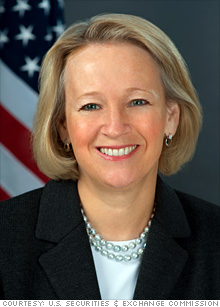SEC chief names four targets for scrutiny
So-called dark pools are among the investing categories that Mary Schapiro plans to look at very carefully.
 |
| Securities and Exchange Commission chairman Mary Schapiro. |
NEW YORK (Fortune) -- Where will Mary Schapiro focus her scrutiny? That's no small matter to the investing world.
A day after President Obama unveiled the foundation for a sweeping overhaul of the U.S. financial system, Securities and Exchange Commission chairman Schapiro detailed specific targets of potential new regulation.
She named four: target-date funds, municipal securities, investment advisers and so-called dark pools.
"These are four areas where I believe the SEC has a particular responsibility to ensure that the markets work for individual investors, not just for institutions and professionals," Schapiro said in a speech to financial writers Thursday night. (The event honored Fortune senior editor at large Allan Sloan.)
Alternative markets. Schapiro's reference to possible regulation of "dark pools" has received the most attention so far. Dark pools, operated by banks from Goldman Sachs (GS, Fortune 500) to BNP Paribas, allow institutional investors like mutual funds to move big blocks of shares in the alternative-trading markets without displaying public price quotes. The question for the SEC is whether these alternative markets give institutions a leg up on retail investors.
"We have heard concerns from market participants that the lack of post-trade transparency by dark pools makes it difficult, if not impossible, for the public to assess dark-pool trading and to identify pools that are most active in particular stocks," Schapiro said.
Trading on these alternative markets rose to 24% of trades made in April, up from 15% last September, according to Fidelity Capital Markets. While trading has remained heaviest in large exchanges like the New York Stock Exchange and NASDAQ, market share has been shifting to these dark pools. Fidelity says NASDAQ's market share fell from 30% to 20% over the same time period. In response, Nasdaq OMX and NYSE Euronext are pushing the SEC to regulate pools.
One alternative exchange, BATS Exchange, which routes trades through dark pools, declined to comment on Friday about Schapiro's remarks.
But look for BATS and others to come under greater scrutiny for dark pools and flash orders, a method used by alternative exchanges to show all market members a potential trade, if it's not matched, before it's sent to a public exchange.
Full disclosure. She also called for better regulation of broker-dealer behavior to ensure they put investors' best interest first. In addition, she addressed target date funds, which have been popular retirement-plan investments because investors can put their money in one place and rely on the fund manager to rebalance their portfolios, moving assets among stocks, bonds and other investments. Schapiro said these funds are hard to evaluate because their structure varies so much. She cited the returns on the 31 funds with a 2010 target date: Their returns ranged from -- 4% to -- 41% in 2008. (See: Target funds miss the mark.)
Schapiro also called for increased disclosure to be made available to investors in municipal securities because many people expect little or no chance of default on such securities, which is not exactly the case; in 2008, 140 municipal issuers defaulted on $7.6 billion in bonds. "Despite the tremendous importance of these markets and the broad retail participation," she said, "the information available to municipal securities investors is lacking, compared to the information available to investors in public corporations."
All night, journalists with open note pads hovered around Schapiro, who has taken over SEC at a time when its task is an epic one. After her speech, she fielded questions about Bernie Madoff. She declined to say how the SEC went wrong in its failure to detect Madoff's scheme, deferring instead to an inspector general's report to be released this summer, but said the SEC is revamping its process to deal with the 2,000 tips it receives each day.
Schapiro added that the SEC aims to set up a whistle-blower compensation system funded by the fines it collects.
"We must re-make the agency into the kind of nimble, effective and rigorous regulator that American investors deserve in the 21st century," she said. "It is fair that we be judged by our actions, not by our words." ![]()
-
 The retail giant tops the Fortune 500 for the second year in a row. Who else made the list? More
The retail giant tops the Fortune 500 for the second year in a row. Who else made the list? More -
 This group of companies is all about social networking to connect with their customers. More
This group of companies is all about social networking to connect with their customers. More -
 The fight over the cholesterol medication is keeping a generic version from hitting the market. More
The fight over the cholesterol medication is keeping a generic version from hitting the market. More -
 Bin Laden may be dead, but the terrorist group he led doesn't need his money. More
Bin Laden may be dead, but the terrorist group he led doesn't need his money. More -
 U.S. real estate might be a mess, but in other parts of the world, home prices are jumping. More
U.S. real estate might be a mess, but in other parts of the world, home prices are jumping. More -
 Libya's output is a fraction of global production, but it's crucial to the nation's economy. More
Libya's output is a fraction of global production, but it's crucial to the nation's economy. More -
 Once rates start to rise, things could get ugly fast for our neighbors to the north. More
Once rates start to rise, things could get ugly fast for our neighbors to the north. More







